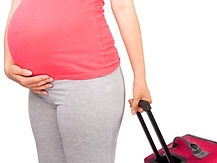Childbirth Information

Screening for Down Syndrome and other Conditions
Screening can provide some information about the chance of your baby having Down syndrome or another condition. First trimester screening is optional and involves a blood test and a nuchal translucency (NT) ultrasound scan combined with other information, such as your age and weight, to find out whether you have a low or increased risk.
GBS Screening
Neonatal group B strep is acquired by the baby by vertical transmission from the birth canal around the time of birth. Two strategies are used for identifying women at increased risk: universal antenatal screening and risk-based screening. In both strategies high risk women are offered intrapartum antibiotic prophylaxis (IAP), which has been shown to be effective in preventing vertical transmission of GBS.


Breastfeeding
Breastfeeding is best for both mothers and babies. The World Health Organization and the New Zealand Ministry of Health recommend breastfeeding until babies are ready for and need extra food at around 6 months with continued breastfeeding until at least one year of age and beyond WHO, 2012). Many mothers need help when they begin breastfeeding, especially with a first baby. There is a good network of support available.

Homebirth
Home birth is recognised and promoted as an option for the place of birth for the majority of women and their whānau in Aotearoa / New Zealand. The benefits gained by women who choose to birth their babies in the comfort and safety of their home are immeasurable. A woman's home is the best environment for an unmedicated birth with significantly less risk of unnecessary interventions. The benefits are felt by the whole whanau.

Travelling when Pregnant
Many women fly when pregnant and have no difficulties, but it is recommended that you discuss your travel plans with your doctor or midwife.
If you are carrying one baby and the pregnancy is uncomplicated, with medical clearance from your midwife or doctor you can travel up to the end of the 35th week for flights over 5 hours and to the end of the 37th week for flights under 5 hours.

Eco Parenting
Becoming parents means investing in the future. Your children, and your children's children will live on this Earth long after you're gone, and knowing that sort of thing makes a lot of parents more eco-conscious than ever before. A woman who may have thought little about recycling before can turn into a green-minded mum with a desire to make the world a healthier place to live. Whether you're a newly green mum, or a lifelong crusader,there are many great ways you can help to preserve the Earth for future generations.

Cloth Nappies
Make use of cloth nappies that can be cleaned and worn over and over again instead of thrown away.
Did you know that if every parent in New Zealand used just 1 cloth nappy on their baby per day we could prevent 1 Million nappies from going to landfill per week?*Source Zero waste Cloth nappies are also far better for your pocket. It is possible to save around $4000 per child just by using cloth nappies!

Antenatal and Postnatal Anxiety and Depression
Expecting a new baby is supposed to be a time of joy, but it's not this way for every woman. For some, pregnancy and the arrival of a new baby can be a time of stress and anxiety, Most of these feelings are normal, but sometimes they can become overwhelming and women can develop anxiety or depression both antenatally and postnatally.
If you don't feel they way you expected to feel in pregnancy or in the postaprtum period, it is important to talk to your midwife or GP.


